Indigenous People: Culture, Challenges, and Rights
VerifiedAdded on 2023/06/03
|10
|2317
|93
AI Summary
This text explores the culture, challenges, and rights of Indigenous People. It covers topics such as autonomy, self-determination, sustainability, and the impact of globalization on Indigenous cultures. The text also discusses the importance of land management and the preservation of Indigenous traditions and practices.
Contribute Materials
Your contribution can guide someone’s learning journey. Share your
documents today.
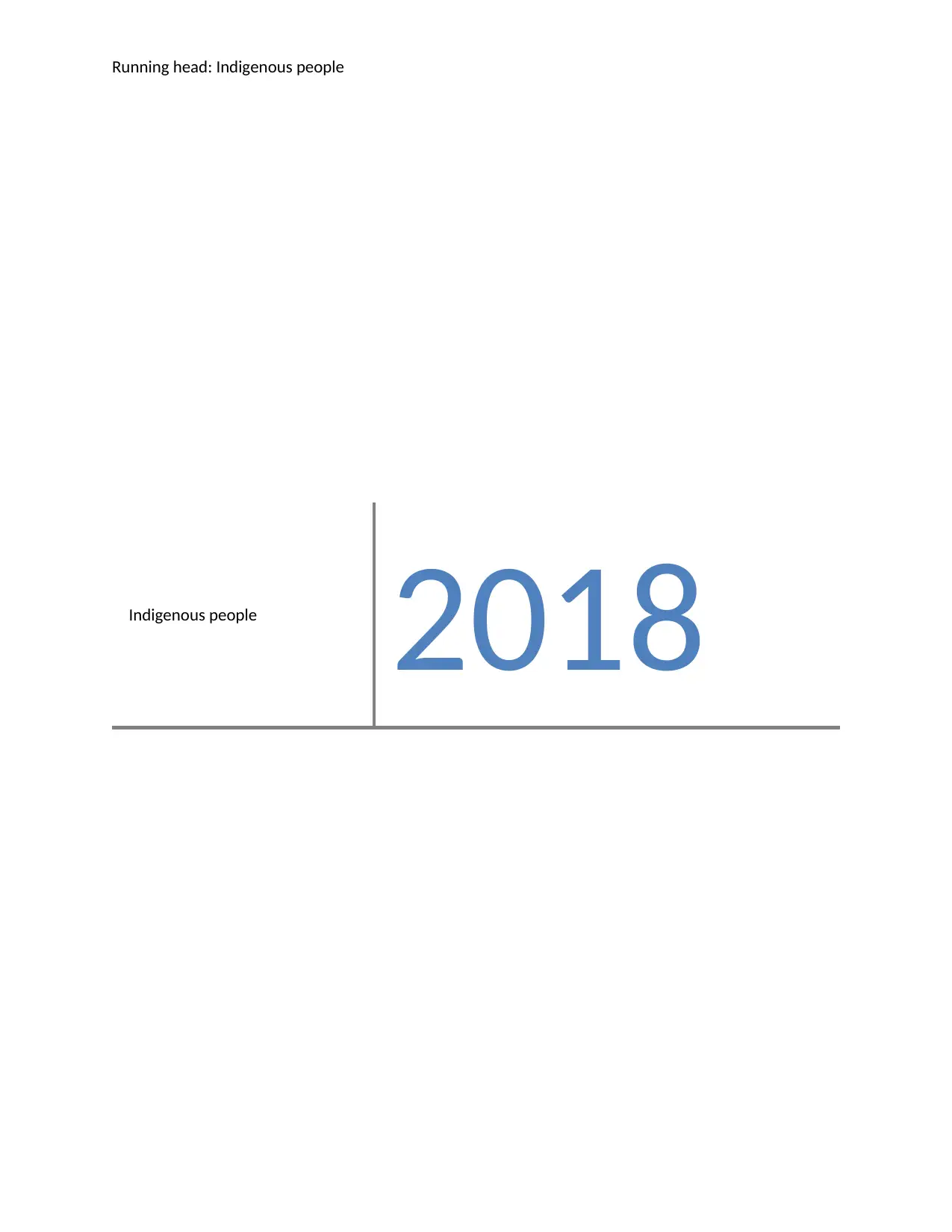
Running head: Indigenous people
Indigenous people
2018
Indigenous people
2018
Secure Best Marks with AI Grader
Need help grading? Try our AI Grader for instant feedback on your assignments.
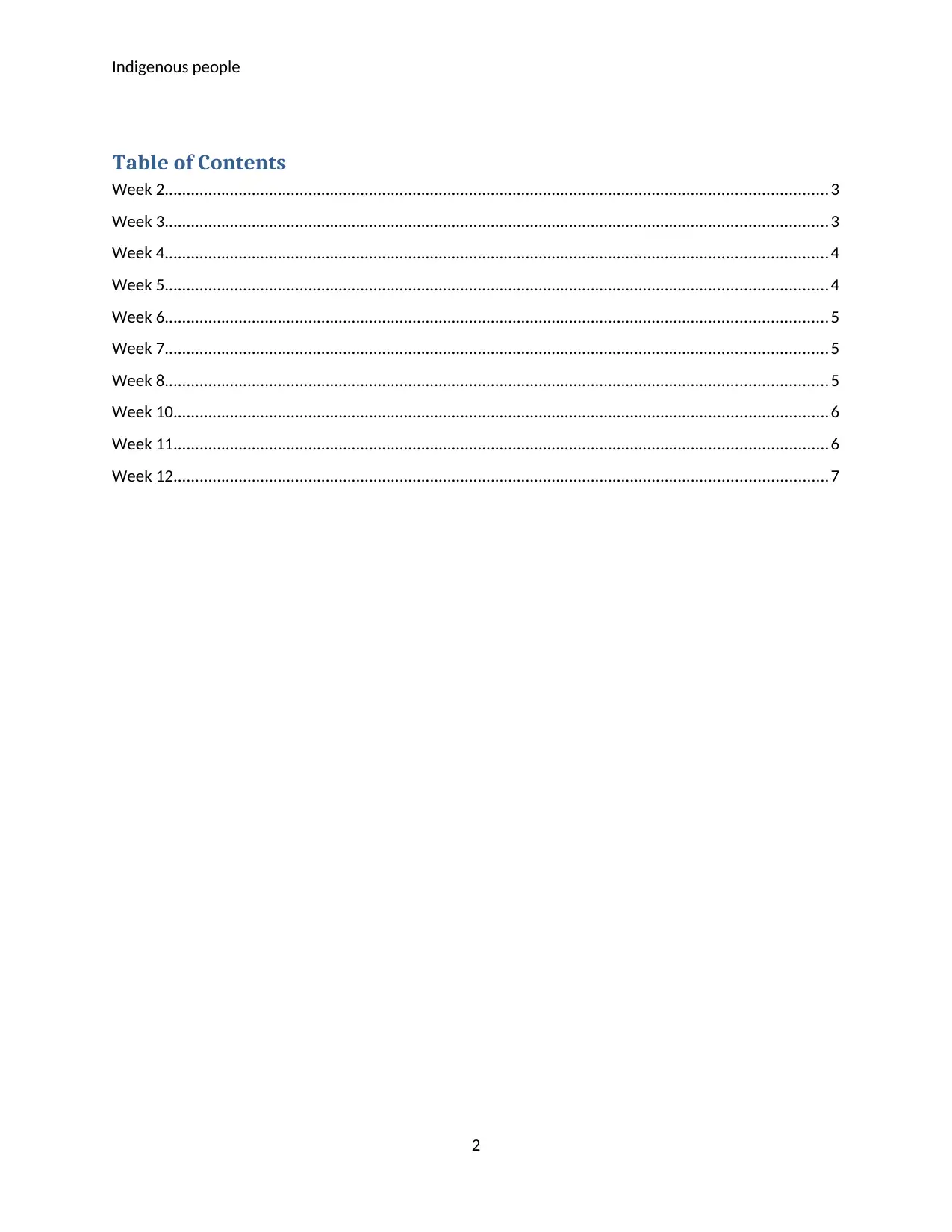
Indigenous people
Table of Contents
Week 2........................................................................................................................................................3
Week 3........................................................................................................................................................3
Week 4........................................................................................................................................................4
Week 5........................................................................................................................................................4
Week 6........................................................................................................................................................5
Week 7........................................................................................................................................................5
Week 8........................................................................................................................................................5
Week 10......................................................................................................................................................6
Week 11......................................................................................................................................................6
Week 12......................................................................................................................................................7
2
Table of Contents
Week 2........................................................................................................................................................3
Week 3........................................................................................................................................................3
Week 4........................................................................................................................................................4
Week 5........................................................................................................................................................4
Week 6........................................................................................................................................................5
Week 7........................................................................................................................................................5
Week 8........................................................................................................................................................5
Week 10......................................................................................................................................................6
Week 11......................................................................................................................................................6
Week 12......................................................................................................................................................7
2
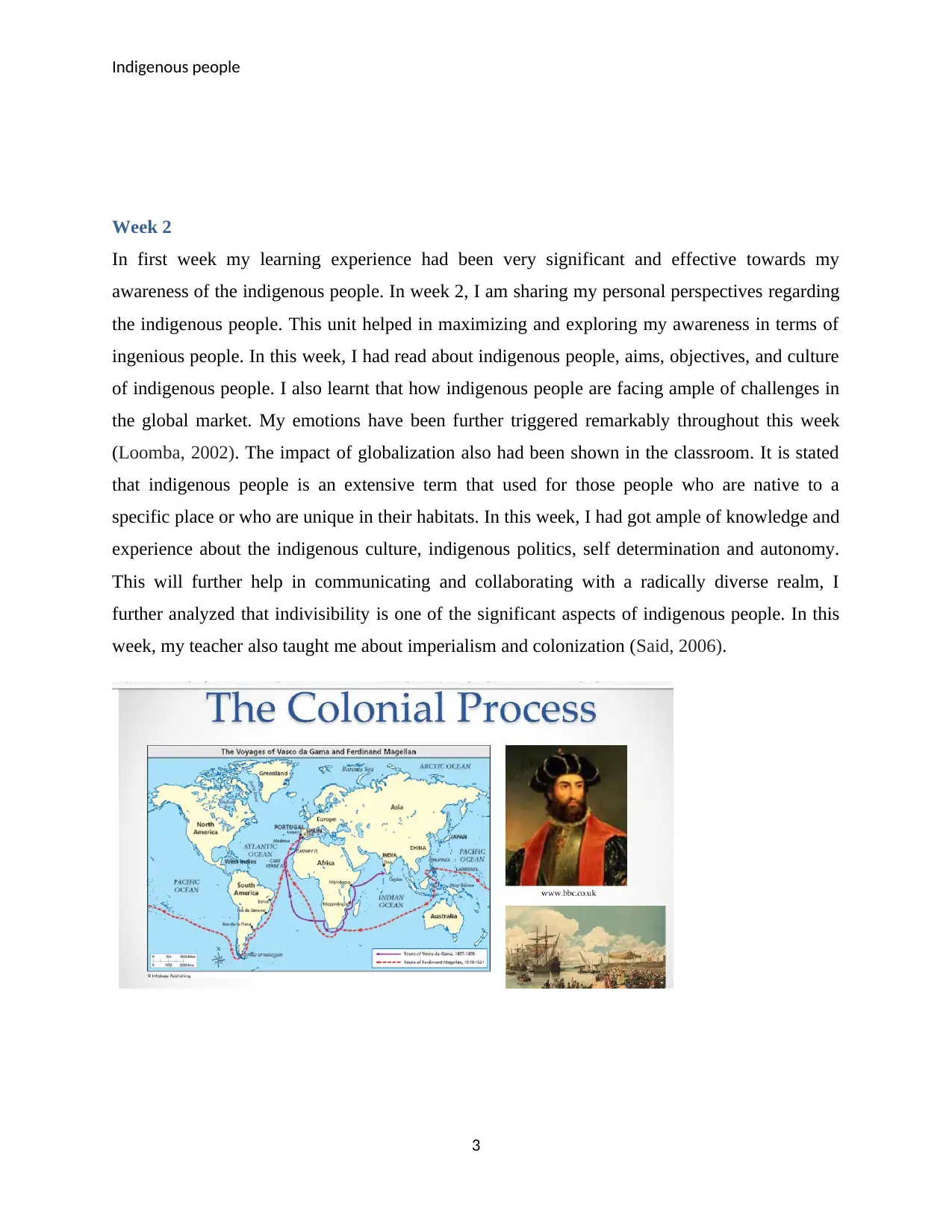
Indigenous people
Week 2
In first week my learning experience had been very significant and effective towards my
awareness of the indigenous people. In week 2, I am sharing my personal perspectives regarding
the indigenous people. This unit helped in maximizing and exploring my awareness in terms of
ingenious people. In this week, I had read about indigenous people, aims, objectives, and culture
of indigenous people. I also learnt that how indigenous people are facing ample of challenges in
the global market. My emotions have been further triggered remarkably throughout this week
(Loomba, 2002). The impact of globalization also had been shown in the classroom. It is stated
that indigenous people is an extensive term that used for those people who are native to a
specific place or who are unique in their habitats. In this week, I had got ample of knowledge and
experience about the indigenous culture, indigenous politics, self determination and autonomy.
This will further help in communicating and collaborating with a radically diverse realm, I
further analyzed that indivisibility is one of the significant aspects of indigenous people. In this
week, my teacher also taught me about imperialism and colonization (Said, 2006).
3
Week 2
In first week my learning experience had been very significant and effective towards my
awareness of the indigenous people. In week 2, I am sharing my personal perspectives regarding
the indigenous people. This unit helped in maximizing and exploring my awareness in terms of
ingenious people. In this week, I had read about indigenous people, aims, objectives, and culture
of indigenous people. I also learnt that how indigenous people are facing ample of challenges in
the global market. My emotions have been further triggered remarkably throughout this week
(Loomba, 2002). The impact of globalization also had been shown in the classroom. It is stated
that indigenous people is an extensive term that used for those people who are native to a
specific place or who are unique in their habitats. In this week, I had got ample of knowledge and
experience about the indigenous culture, indigenous politics, self determination and autonomy.
This will further help in communicating and collaborating with a radically diverse realm, I
further analyzed that indivisibility is one of the significant aspects of indigenous people. In this
week, my teacher also taught me about imperialism and colonization (Said, 2006).
3
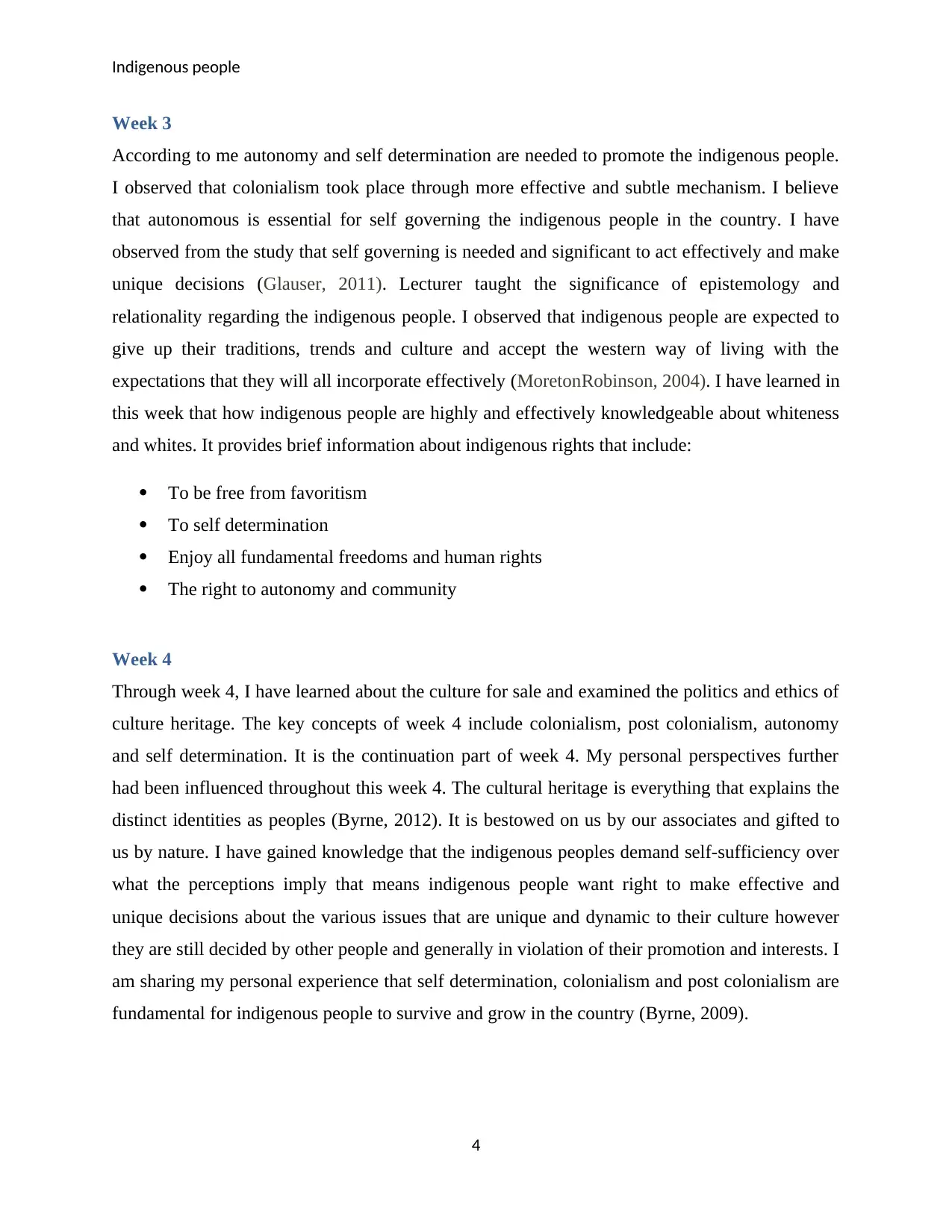
Indigenous people
Week 3
According to me autonomy and self determination are needed to promote the indigenous people.
I observed that colonialism took place through more effective and subtle mechanism. I believe
that autonomous is essential for self governing the indigenous people in the country. I have
observed from the study that self governing is needed and significant to act effectively and make
unique decisions (Glauser, 2011). Lecturer taught the significance of epistemology and
relationality regarding the indigenous people. I observed that indigenous people are expected to
give up their traditions, trends and culture and accept the western way of living with the
expectations that they will all incorporate effectively (MoretonRobinson, 2004). I have learned in
this week that how indigenous people are highly and effectively knowledgeable about whiteness
and whites. It provides brief information about indigenous rights that include:
To be free from favoritism
To self determination
Enjoy all fundamental freedoms and human rights
The right to autonomy and community
Week 4
Through week 4, I have learned about the culture for sale and examined the politics and ethics of
culture heritage. The key concepts of week 4 include colonialism, post colonialism, autonomy
and self determination. It is the continuation part of week 4. My personal perspectives further
had been influenced throughout this week 4. The cultural heritage is everything that explains the
distinct identities as peoples (Byrne, 2012). It is bestowed on us by our associates and gifted to
us by nature. I have gained knowledge that the indigenous peoples demand self-sufficiency over
what the perceptions imply that means indigenous people want right to make effective and
unique decisions about the various issues that are unique and dynamic to their culture however
they are still decided by other people and generally in violation of their promotion and interests. I
am sharing my personal experience that self determination, colonialism and post colonialism are
fundamental for indigenous people to survive and grow in the country (Byrne, 2009).
4
Week 3
According to me autonomy and self determination are needed to promote the indigenous people.
I observed that colonialism took place through more effective and subtle mechanism. I believe
that autonomous is essential for self governing the indigenous people in the country. I have
observed from the study that self governing is needed and significant to act effectively and make
unique decisions (Glauser, 2011). Lecturer taught the significance of epistemology and
relationality regarding the indigenous people. I observed that indigenous people are expected to
give up their traditions, trends and culture and accept the western way of living with the
expectations that they will all incorporate effectively (MoretonRobinson, 2004). I have learned in
this week that how indigenous people are highly and effectively knowledgeable about whiteness
and whites. It provides brief information about indigenous rights that include:
To be free from favoritism
To self determination
Enjoy all fundamental freedoms and human rights
The right to autonomy and community
Week 4
Through week 4, I have learned about the culture for sale and examined the politics and ethics of
culture heritage. The key concepts of week 4 include colonialism, post colonialism, autonomy
and self determination. It is the continuation part of week 4. My personal perspectives further
had been influenced throughout this week 4. The cultural heritage is everything that explains the
distinct identities as peoples (Byrne, 2012). It is bestowed on us by our associates and gifted to
us by nature. I have gained knowledge that the indigenous peoples demand self-sufficiency over
what the perceptions imply that means indigenous people want right to make effective and
unique decisions about the various issues that are unique and dynamic to their culture however
they are still decided by other people and generally in violation of their promotion and interests. I
am sharing my personal experience that self determination, colonialism and post colonialism are
fundamental for indigenous people to survive and grow in the country (Byrne, 2009).
4
Secure Best Marks with AI Grader
Need help grading? Try our AI Grader for instant feedback on your assignments.
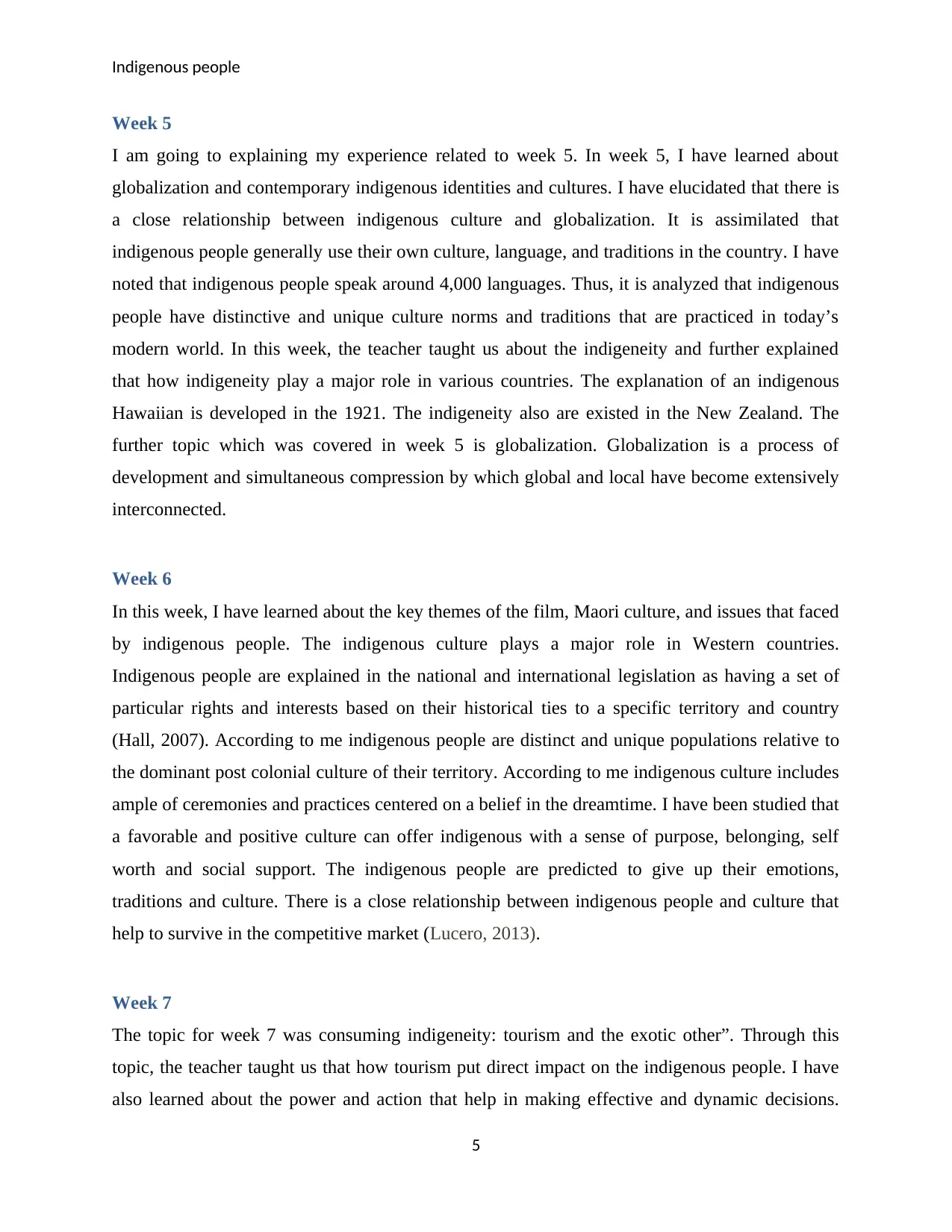
Indigenous people
Week 5
I am going to explaining my experience related to week 5. In week 5, I have learned about
globalization and contemporary indigenous identities and cultures. I have elucidated that there is
a close relationship between indigenous culture and globalization. It is assimilated that
indigenous people generally use their own culture, language, and traditions in the country. I have
noted that indigenous people speak around 4,000 languages. Thus, it is analyzed that indigenous
people have distinctive and unique culture norms and traditions that are practiced in today’s
modern world. In this week, the teacher taught us about the indigeneity and further explained
that how indigeneity play a major role in various countries. The explanation of an indigenous
Hawaiian is developed in the 1921. The indigeneity also are existed in the New Zealand. The
further topic which was covered in week 5 is globalization. Globalization is a process of
development and simultaneous compression by which global and local have become extensively
interconnected.
Week 6
In this week, I have learned about the key themes of the film, Maori culture, and issues that faced
by indigenous people. The indigenous culture plays a major role in Western countries.
Indigenous people are explained in the national and international legislation as having a set of
particular rights and interests based on their historical ties to a specific territory and country
(Hall, 2007). According to me indigenous people are distinct and unique populations relative to
the dominant post colonial culture of their territory. According to me indigenous culture includes
ample of ceremonies and practices centered on a belief in the dreamtime. I have been studied that
a favorable and positive culture can offer indigenous with a sense of purpose, belonging, self
worth and social support. The indigenous people are predicted to give up their emotions,
traditions and culture. There is a close relationship between indigenous people and culture that
help to survive in the competitive market (Lucero, 2013).
Week 7
The topic for week 7 was consuming indigeneity: tourism and the exotic other”. Through this
topic, the teacher taught us that how tourism put direct impact on the indigenous people. I have
also learned about the power and action that help in making effective and dynamic decisions.
5
Week 5
I am going to explaining my experience related to week 5. In week 5, I have learned about
globalization and contemporary indigenous identities and cultures. I have elucidated that there is
a close relationship between indigenous culture and globalization. It is assimilated that
indigenous people generally use their own culture, language, and traditions in the country. I have
noted that indigenous people speak around 4,000 languages. Thus, it is analyzed that indigenous
people have distinctive and unique culture norms and traditions that are practiced in today’s
modern world. In this week, the teacher taught us about the indigeneity and further explained
that how indigeneity play a major role in various countries. The explanation of an indigenous
Hawaiian is developed in the 1921. The indigeneity also are existed in the New Zealand. The
further topic which was covered in week 5 is globalization. Globalization is a process of
development and simultaneous compression by which global and local have become extensively
interconnected.
Week 6
In this week, I have learned about the key themes of the film, Maori culture, and issues that faced
by indigenous people. The indigenous culture plays a major role in Western countries.
Indigenous people are explained in the national and international legislation as having a set of
particular rights and interests based on their historical ties to a specific territory and country
(Hall, 2007). According to me indigenous people are distinct and unique populations relative to
the dominant post colonial culture of their territory. According to me indigenous culture includes
ample of ceremonies and practices centered on a belief in the dreamtime. I have been studied that
a favorable and positive culture can offer indigenous with a sense of purpose, belonging, self
worth and social support. The indigenous people are predicted to give up their emotions,
traditions and culture. There is a close relationship between indigenous people and culture that
help to survive in the competitive market (Lucero, 2013).
Week 7
The topic for week 7 was consuming indigeneity: tourism and the exotic other”. Through this
topic, the teacher taught us that how tourism put direct impact on the indigenous people. I have
also learned about the power and action that help in making effective and dynamic decisions.
5
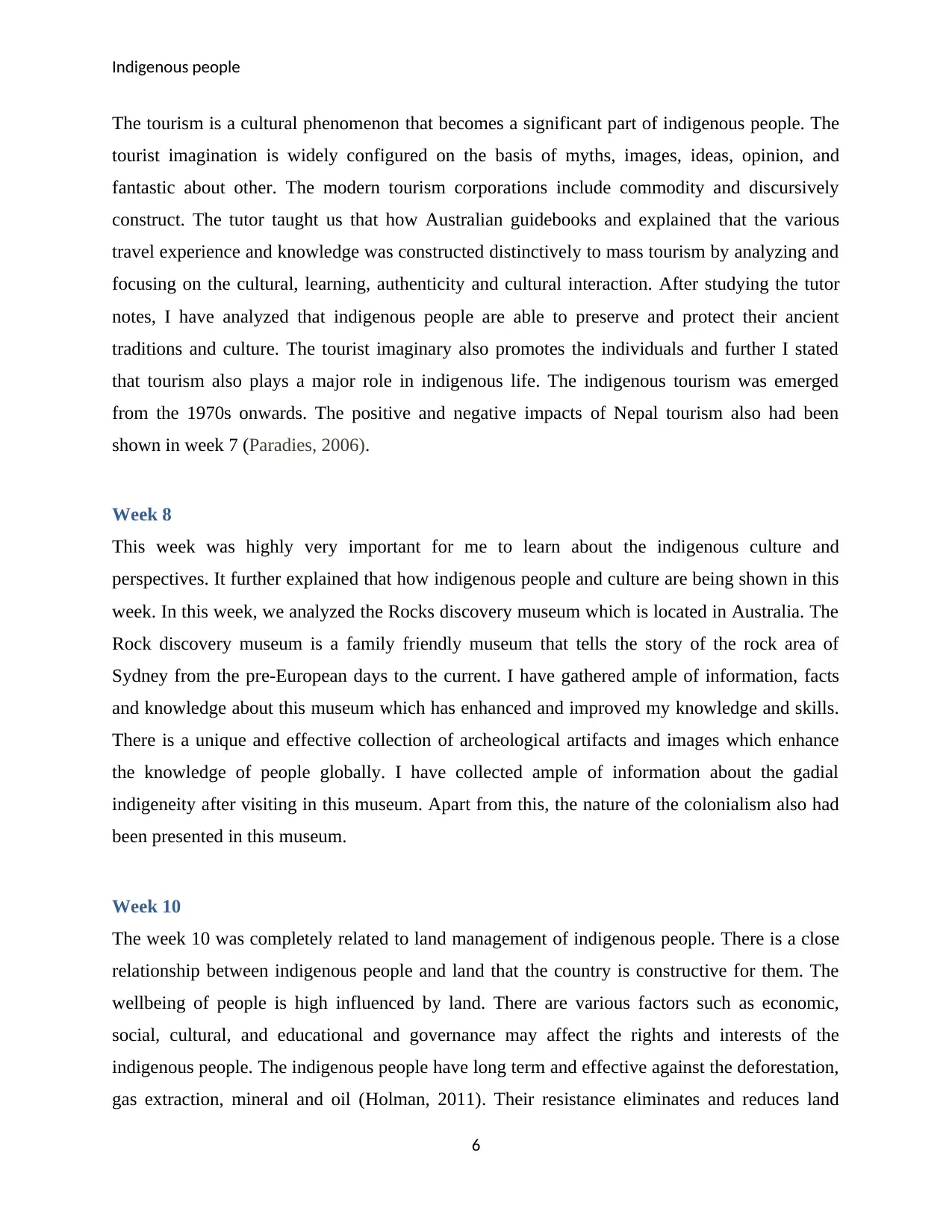
Indigenous people
The tourism is a cultural phenomenon that becomes a significant part of indigenous people. The
tourist imagination is widely configured on the basis of myths, images, ideas, opinion, and
fantastic about other. The modern tourism corporations include commodity and discursively
construct. The tutor taught us that how Australian guidebooks and explained that the various
travel experience and knowledge was constructed distinctively to mass tourism by analyzing and
focusing on the cultural, learning, authenticity and cultural interaction. After studying the tutor
notes, I have analyzed that indigenous people are able to preserve and protect their ancient
traditions and culture. The tourist imaginary also promotes the individuals and further I stated
that tourism also plays a major role in indigenous life. The indigenous tourism was emerged
from the 1970s onwards. The positive and negative impacts of Nepal tourism also had been
shown in week 7 (Paradies, 2006).
Week 8
This week was highly very important for me to learn about the indigenous culture and
perspectives. It further explained that how indigenous people and culture are being shown in this
week. In this week, we analyzed the Rocks discovery museum which is located in Australia. The
Rock discovery museum is a family friendly museum that tells the story of the rock area of
Sydney from the pre-European days to the current. I have gathered ample of information, facts
and knowledge about this museum which has enhanced and improved my knowledge and skills.
There is a unique and effective collection of archeological artifacts and images which enhance
the knowledge of people globally. I have collected ample of information about the gadial
indigeneity after visiting in this museum. Apart from this, the nature of the colonialism also had
been presented in this museum.
Week 10
The week 10 was completely related to land management of indigenous people. There is a close
relationship between indigenous people and land that the country is constructive for them. The
wellbeing of people is high influenced by land. There are various factors such as economic,
social, cultural, and educational and governance may affect the rights and interests of the
indigenous people. The indigenous people have long term and effective against the deforestation,
gas extraction, mineral and oil (Holman, 2011). Their resistance eliminates and reduces land
6
The tourism is a cultural phenomenon that becomes a significant part of indigenous people. The
tourist imagination is widely configured on the basis of myths, images, ideas, opinion, and
fantastic about other. The modern tourism corporations include commodity and discursively
construct. The tutor taught us that how Australian guidebooks and explained that the various
travel experience and knowledge was constructed distinctively to mass tourism by analyzing and
focusing on the cultural, learning, authenticity and cultural interaction. After studying the tutor
notes, I have analyzed that indigenous people are able to preserve and protect their ancient
traditions and culture. The tourist imaginary also promotes the individuals and further I stated
that tourism also plays a major role in indigenous life. The indigenous tourism was emerged
from the 1970s onwards. The positive and negative impacts of Nepal tourism also had been
shown in week 7 (Paradies, 2006).
Week 8
This week was highly very important for me to learn about the indigenous culture and
perspectives. It further explained that how indigenous people and culture are being shown in this
week. In this week, we analyzed the Rocks discovery museum which is located in Australia. The
Rock discovery museum is a family friendly museum that tells the story of the rock area of
Sydney from the pre-European days to the current. I have gathered ample of information, facts
and knowledge about this museum which has enhanced and improved my knowledge and skills.
There is a unique and effective collection of archeological artifacts and images which enhance
the knowledge of people globally. I have collected ample of information about the gadial
indigeneity after visiting in this museum. Apart from this, the nature of the colonialism also had
been presented in this museum.
Week 10
The week 10 was completely related to land management of indigenous people. There is a close
relationship between indigenous people and land that the country is constructive for them. The
wellbeing of people is high influenced by land. There are various factors such as economic,
social, cultural, and educational and governance may affect the rights and interests of the
indigenous people. The indigenous people have long term and effective against the deforestation,
gas extraction, mineral and oil (Holman, 2011). Their resistance eliminates and reduces land
6
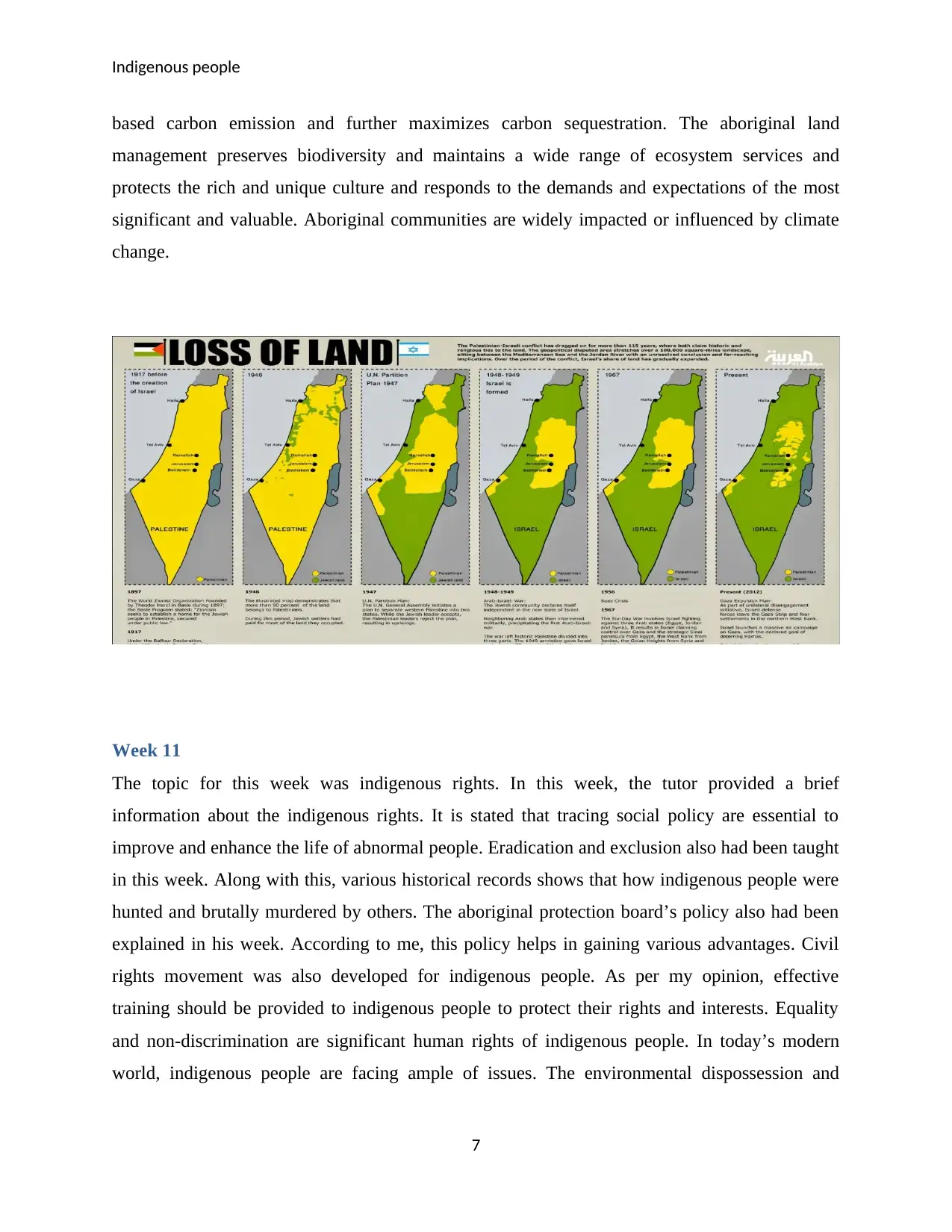
Indigenous people
based carbon emission and further maximizes carbon sequestration. The aboriginal land
management preserves biodiversity and maintains a wide range of ecosystem services and
protects the rich and unique culture and responds to the demands and expectations of the most
significant and valuable. Aboriginal communities are widely impacted or influenced by climate
change.
Week 11
The topic for this week was indigenous rights. In this week, the tutor provided a brief
information about the indigenous rights. It is stated that tracing social policy are essential to
improve and enhance the life of abnormal people. Eradication and exclusion also had been taught
in this week. Along with this, various historical records shows that how indigenous people were
hunted and brutally murdered by others. The aboriginal protection board’s policy also had been
explained in his week. According to me, this policy helps in gaining various advantages. Civil
rights movement was also developed for indigenous people. As per my opinion, effective
training should be provided to indigenous people to protect their rights and interests. Equality
and non-discrimination are significant human rights of indigenous people. In today’s modern
world, indigenous people are facing ample of issues. The environmental dispossession and
7
based carbon emission and further maximizes carbon sequestration. The aboriginal land
management preserves biodiversity and maintains a wide range of ecosystem services and
protects the rich and unique culture and responds to the demands and expectations of the most
significant and valuable. Aboriginal communities are widely impacted or influenced by climate
change.
Week 11
The topic for this week was indigenous rights. In this week, the tutor provided a brief
information about the indigenous rights. It is stated that tracing social policy are essential to
improve and enhance the life of abnormal people. Eradication and exclusion also had been taught
in this week. Along with this, various historical records shows that how indigenous people were
hunted and brutally murdered by others. The aboriginal protection board’s policy also had been
explained in his week. According to me, this policy helps in gaining various advantages. Civil
rights movement was also developed for indigenous people. As per my opinion, effective
training should be provided to indigenous people to protect their rights and interests. Equality
and non-discrimination are significant human rights of indigenous people. In today’s modern
world, indigenous people are facing ample of issues. The environmental dispossession and
7
Paraphrase This Document
Need a fresh take? Get an instant paraphrase of this document with our AI Paraphraser
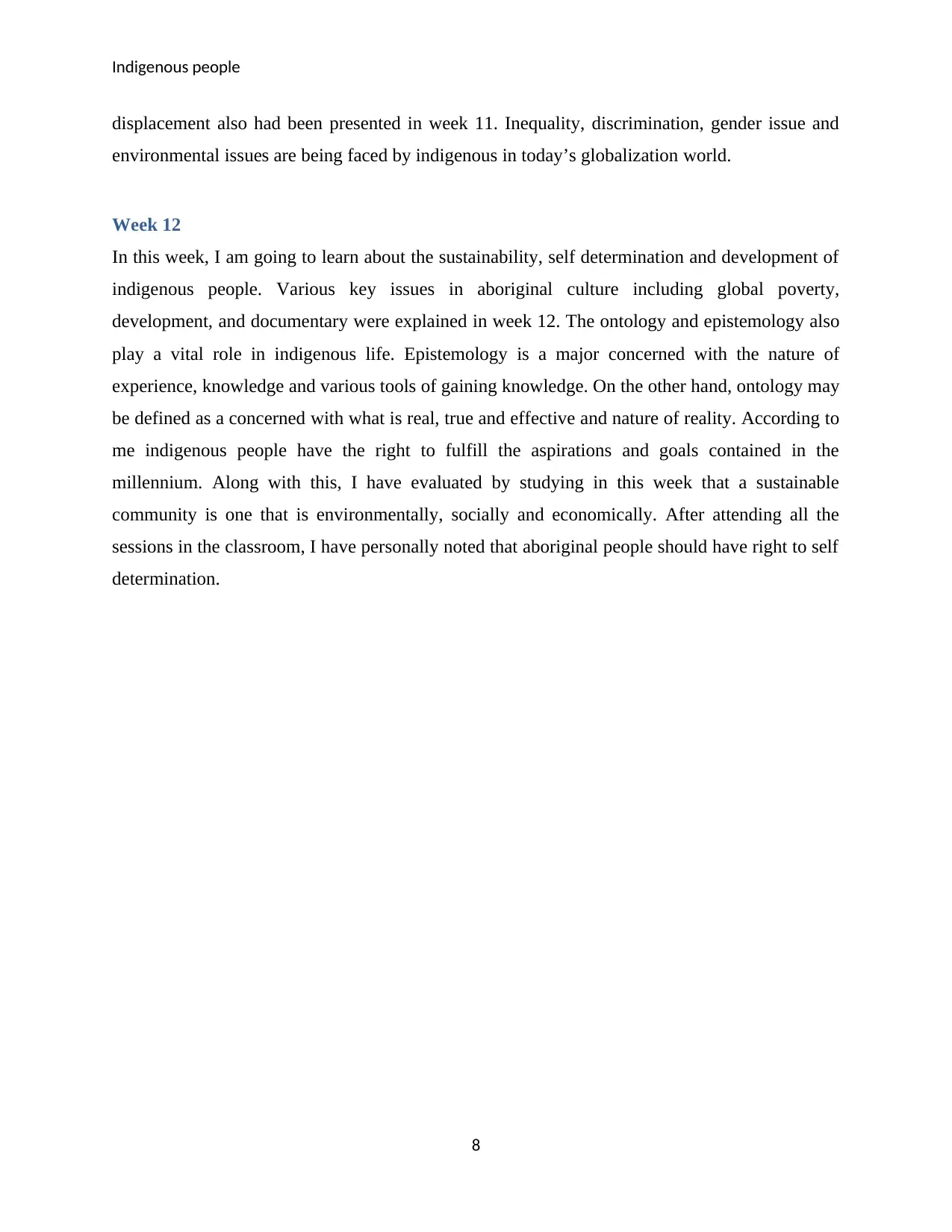
Indigenous people
displacement also had been presented in week 11. Inequality, discrimination, gender issue and
environmental issues are being faced by indigenous in today’s globalization world.
Week 12
In this week, I am going to learn about the sustainability, self determination and development of
indigenous people. Various key issues in aboriginal culture including global poverty,
development, and documentary were explained in week 12. The ontology and epistemology also
play a vital role in indigenous life. Epistemology is a major concerned with the nature of
experience, knowledge and various tools of gaining knowledge. On the other hand, ontology may
be defined as a concerned with what is real, true and effective and nature of reality. According to
me indigenous people have the right to fulfill the aspirations and goals contained in the
millennium. Along with this, I have evaluated by studying in this week that a sustainable
community is one that is environmentally, socially and economically. After attending all the
sessions in the classroom, I have personally noted that aboriginal people should have right to self
determination.
8
displacement also had been presented in week 11. Inequality, discrimination, gender issue and
environmental issues are being faced by indigenous in today’s globalization world.
Week 12
In this week, I am going to learn about the sustainability, self determination and development of
indigenous people. Various key issues in aboriginal culture including global poverty,
development, and documentary were explained in week 12. The ontology and epistemology also
play a vital role in indigenous life. Epistemology is a major concerned with the nature of
experience, knowledge and various tools of gaining knowledge. On the other hand, ontology may
be defined as a concerned with what is real, true and effective and nature of reality. According to
me indigenous people have the right to fulfill the aspirations and goals contained in the
millennium. Along with this, I have evaluated by studying in this week that a sustainable
community is one that is environmentally, socially and economically. After attending all the
sessions in the classroom, I have personally noted that aboriginal people should have right to self
determination.
8
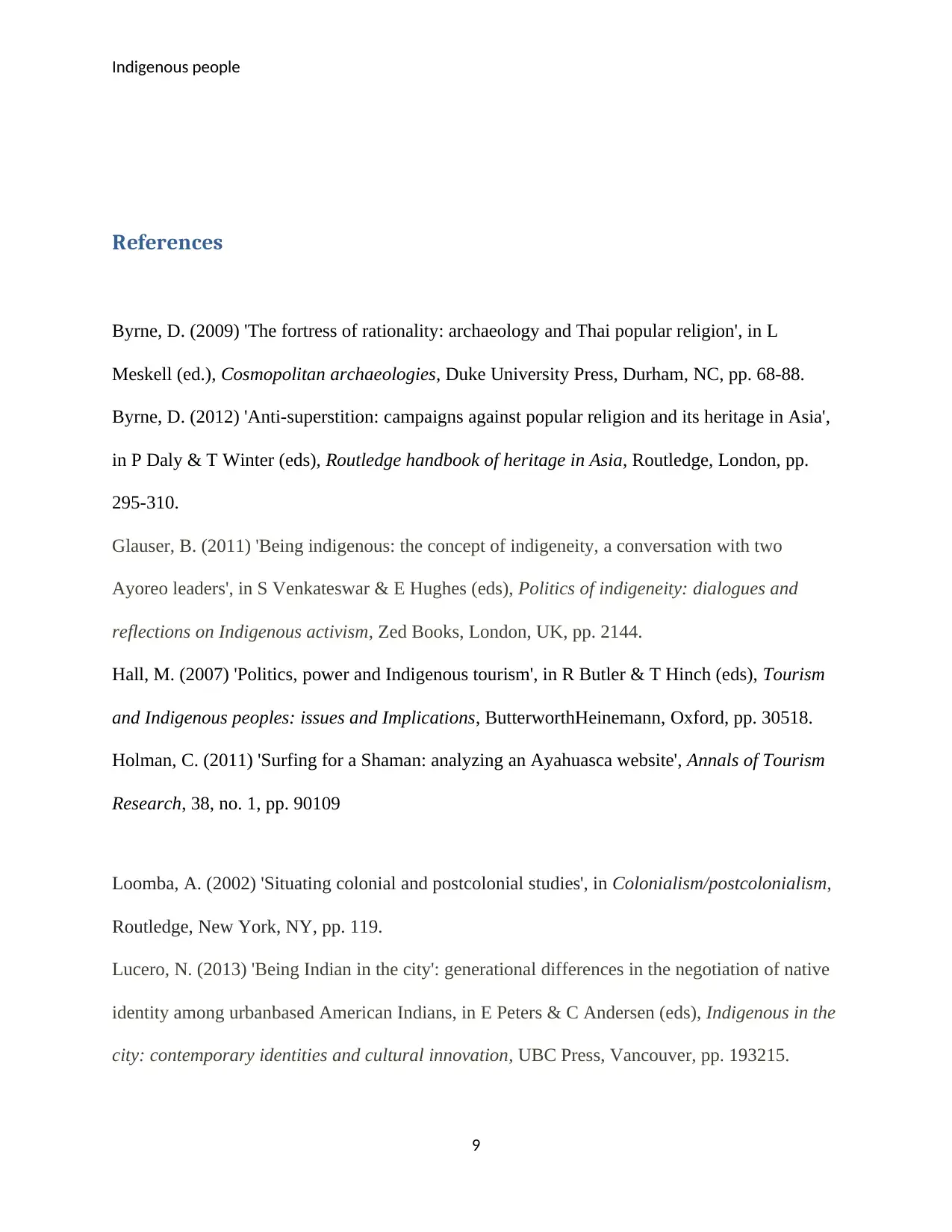
Indigenous people
References
Byrne, D. (2009) 'The fortress of rationality: archaeology and Thai popular religion', in L
Meskell (ed.), Cosmopolitan archaeologies, Duke University Press, Durham, NC, pp. 68-88.
Byrne, D. (2012) 'Anti-superstition: campaigns against popular religion and its heritage in Asia',
in P Daly & T Winter (eds), Routledge handbook of heritage in Asia, Routledge, London, pp.
295-310.
Glauser, B. (2011) 'Being indigenous: the concept of indigeneity, a conversation with two
Ayoreo leaders', in S Venkateswar & E Hughes (eds), Politics of indigeneity: dialogues and
reflections on Indigenous activism, Zed Books, London, UK, pp. 2144.
Hall, M. (2007) 'Politics, power and Indigenous tourism', in R Butler & T Hinch (eds), Tourism
and Indigenous peoples: issues and Implications, ButterworthHeinemann, Oxford, pp. 30518.
Holman, C. (2011) 'Surfing for a Shaman: analyzing an Ayahuasca website', Annals of Tourism
Research, 38, no. 1, pp. 90109
Loomba, A. (2002) 'Situating colonial and postcolonial studies', in Colonialism/postcolonialism,
Routledge, New York, NY, pp. 119.
Lucero, N. (2013) 'Being Indian in the city': generational differences in the negotiation of native
identity among urbanbased American Indians, in E Peters & C Andersen (eds), Indigenous in the
city: contemporary identities and cultural innovation, UBC Press, Vancouver, pp. 193215.
9
References
Byrne, D. (2009) 'The fortress of rationality: archaeology and Thai popular religion', in L
Meskell (ed.), Cosmopolitan archaeologies, Duke University Press, Durham, NC, pp. 68-88.
Byrne, D. (2012) 'Anti-superstition: campaigns against popular religion and its heritage in Asia',
in P Daly & T Winter (eds), Routledge handbook of heritage in Asia, Routledge, London, pp.
295-310.
Glauser, B. (2011) 'Being indigenous: the concept of indigeneity, a conversation with two
Ayoreo leaders', in S Venkateswar & E Hughes (eds), Politics of indigeneity: dialogues and
reflections on Indigenous activism, Zed Books, London, UK, pp. 2144.
Hall, M. (2007) 'Politics, power and Indigenous tourism', in R Butler & T Hinch (eds), Tourism
and Indigenous peoples: issues and Implications, ButterworthHeinemann, Oxford, pp. 30518.
Holman, C. (2011) 'Surfing for a Shaman: analyzing an Ayahuasca website', Annals of Tourism
Research, 38, no. 1, pp. 90109
Loomba, A. (2002) 'Situating colonial and postcolonial studies', in Colonialism/postcolonialism,
Routledge, New York, NY, pp. 119.
Lucero, N. (2013) 'Being Indian in the city': generational differences in the negotiation of native
identity among urbanbased American Indians, in E Peters & C Andersen (eds), Indigenous in the
city: contemporary identities and cultural innovation, UBC Press, Vancouver, pp. 193215.
9
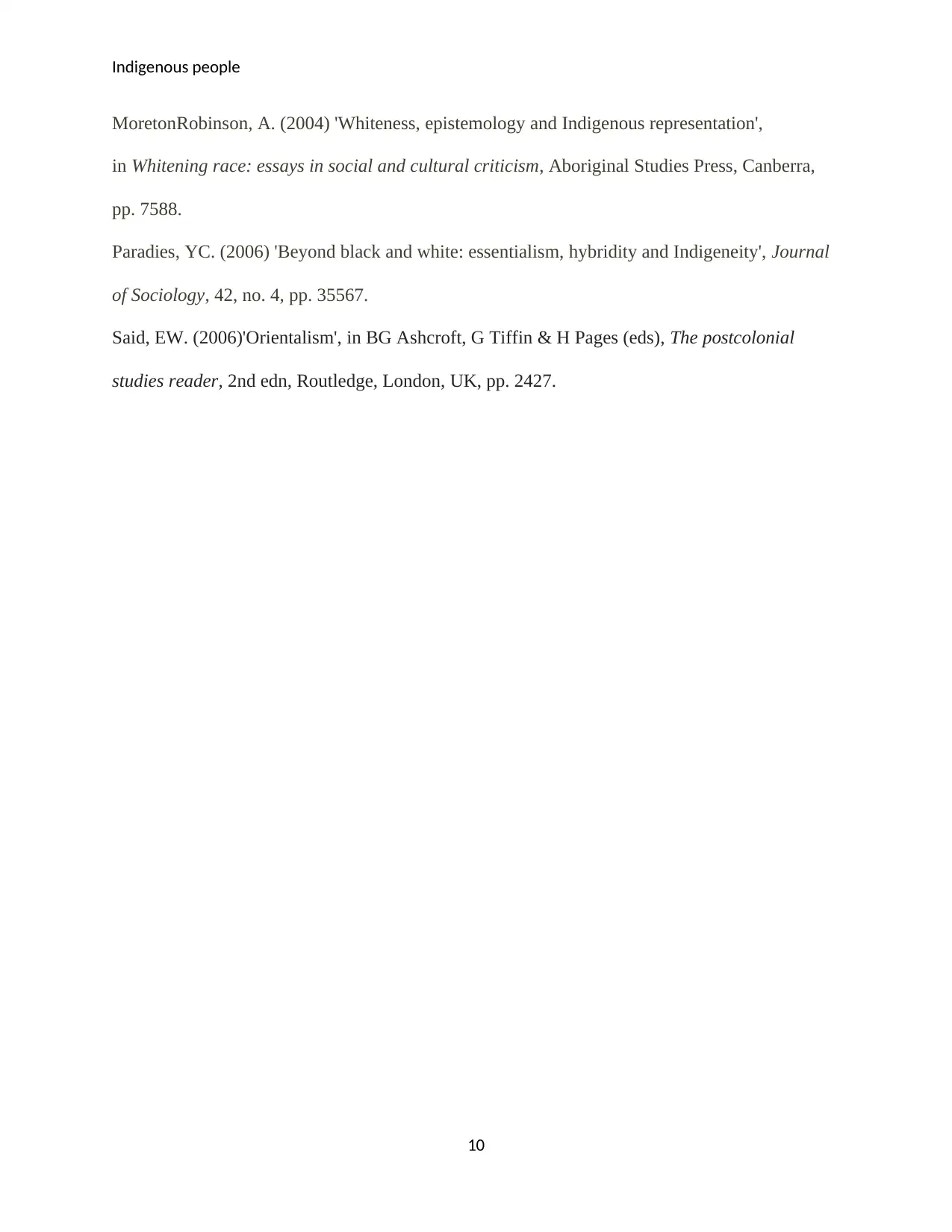
Indigenous people
MoretonRobinson, A. (2004) 'Whiteness, epistemology and Indigenous representation',
in Whitening race: essays in social and cultural criticism, Aboriginal Studies Press, Canberra,
pp. 7588.
Paradies, YC. (2006) 'Beyond black and white: essentialism, hybridity and Indigeneity', Journal
of Sociology, 42, no. 4, pp. 35567.
Said, EW. (2006)'Orientalism', in BG Ashcroft, G Tiffin & H Pages (eds), The postcolonial
studies reader, 2nd edn, Routledge, London, UK, pp. 2427.
10
MoretonRobinson, A. (2004) 'Whiteness, epistemology and Indigenous representation',
in Whitening race: essays in social and cultural criticism, Aboriginal Studies Press, Canberra,
pp. 7588.
Paradies, YC. (2006) 'Beyond black and white: essentialism, hybridity and Indigeneity', Journal
of Sociology, 42, no. 4, pp. 35567.
Said, EW. (2006)'Orientalism', in BG Ashcroft, G Tiffin & H Pages (eds), The postcolonial
studies reader, 2nd edn, Routledge, London, UK, pp. 2427.
10
1 out of 10
Related Documents
Your All-in-One AI-Powered Toolkit for Academic Success.
+13062052269
info@desklib.com
Available 24*7 on WhatsApp / Email
![[object Object]](/_next/static/media/star-bottom.7253800d.svg)
Unlock your academic potential
© 2024 | Zucol Services PVT LTD | All rights reserved.




